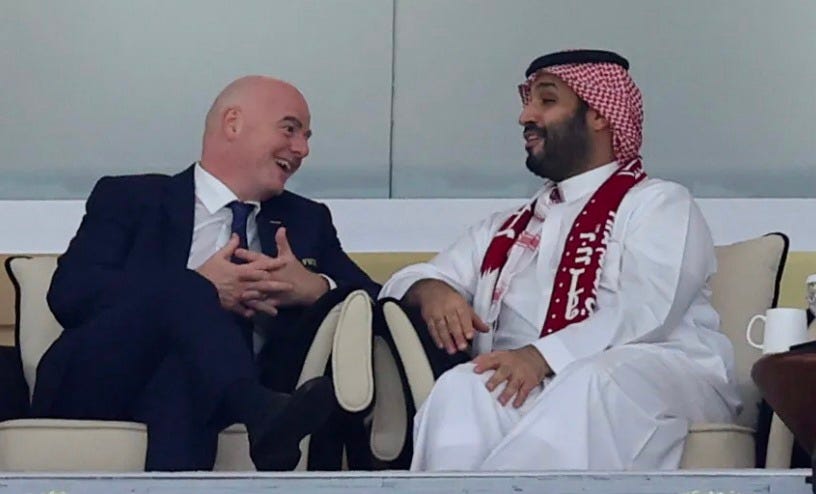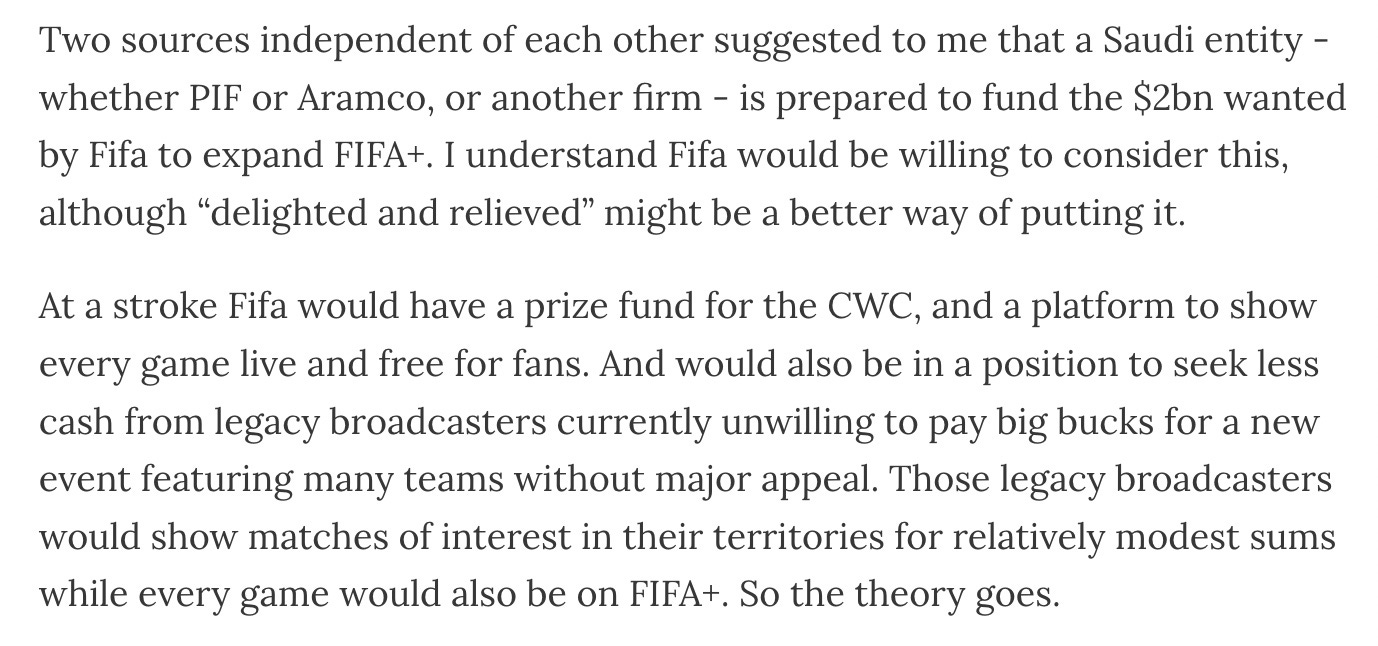For the good of the game? As Saudi 2034 is made reality, football's shame intensifies
A bogus TV deal to screen next year's bloated and unnecessary Club World Cup highlights how football, and Fifa, has finally sold what remained of its soul
This Friday I’m reviving the Sporting Intelligence Q&A, aka, ‘Your Questions, My Answers’. Ask me anything, either in the comments section of this piece, or via email (nick@sportingintelligence.com) or via social media, and I’ll try to answer as many as possible, on any sporting or non-sporting subject. It has always been my intention for this to be a collaborative space, so fire away. And so to today’s piece …
British-based streaming service DAZN's deal to pay $1bn for the global rights to screen next year’s Fifa Club World Cup makes no sense whatsoever commercially according to sources close to both the broadcaster and football’s world governing body.
“Paying a billion dollars for rights to a tournament that most people don’t give a toss about is ridiculous,” said one veteran football rights analyst.
“There is absolutely zero chance of any ROI [return on investment]. A massive loss is built in here. If there had been any prospect of the Club World Cup being a hit, in broadcast terms, there would have been serious bidders from multiple parts of the world.”
Instead, sources say, there were few bids from any territories, and those that did materialise were mostly for single-digit millions of dollars or euros, even in nations with huge populations, including the USA, the host nation.
But, as has been widely speculated, the DAZN-CWC tie-up is a marriage of convenience with a significant third party in the relationship: Saudi Arabia. It is not yet confirmed precisely how Saudi Arabia will funnel the money to DAZN but sources insist that will happen.
It has been reported that Saudi Arabia will pay $1bn for 10% of DAZN but both sides deny this, on and off the record.
Yet multiple sources say Saudi Arabia will foot the bill for Fifa to have a broadcast partner for next year’s event. Why will the Saudis be paying?
Today is the ideal day to ask that question, because Saudi Arabia will, this afternoon, be formally confirmed as the host nation of the 2034 men’s World Cup. And this is likely to be confirmed by acclamation. Or in other words, there won’t be a vote.
It will a fait accompli, and become official because there is only one bid for 2030 on the table - to be hosted, ludicrously, by six nations across three continents, by Spain, Portugal, Morocco, Argentina, Uruguay and Paraguay - and only one bid for 2034, from Saudi Arabia.
Those two tournaments were effectively announced together in a stitch-up that lacked any transparency at all and which nobody at Fifa will talk about, on the record at least.
As part of the murkiest World Cup hosting assignments since the 2018 and 2022 World Cups went to Russia and Qatar, the DAZN deal for the 2025 CWC TV rights is just another piece in a weird geopolitical jigsaw.
There have been dissenting voices about Saudi 2034 from within the global football community but they have been few and far between. The most vocal voice has been that of the Norwegian Football Federation (NFF), and its hugely impressive president, Lise Klaveness. (Below)
"Ahead of the {Fifa] Congress [on Wednesday], the Norwegian Football Federation has expressed concerns on several occasions about FIFA's process for awarding the 2030 and 2034 World Cups," the NFF said.
"The NFF will formally criticise the bidding process in a letter to FIFA and request that this be recorded in the Congress minutes.”
Fifa recently published an evaluation report on Saudi’s bid for 2034 that gave it, in effect, the highest rating of any bidding country in history, despite 11 venues not existing yet, and long-standing concerns over the nation’s human rights record.
"Fifa’s own guidelines for human rights and due diligence have also not been adequately integrated into the process, increasing the risk of human rights violations," Klaveness said.
Before we explore the most ludicrous recent claims of Fifa president Gianni Infantino about how successful next summer’s CWC will be, I’ll recap quite how stupid DAZN’s commitment of $1bn to screen that tournament would be - if it weren’t being funded by Saudi Arabia.
Some fans of the clubs involved will tune in, of course, if they want to give up their email addresses and contact details to access the DAZN platform where games will be shown. This will mean, perhaps, as many as a few million people will watch some of the games live.
DAZN won’t be making money from subscribers for this. Advertising revenue will be minimal, as will sponsorship of the coverage. Yes, DAZN will be able to harvest email and contact details from anyone who signs up to watch matches for free (and this will be mandatory). But the chances of someone tuning in to watch their team playing in the CWC then becoming a paying subscriber to other DAZN content are minimal.
When I wrote about football’s congested calendar two months ago and the CWC adding more problems, I included the graphic below showing the world rankings (at the time) of the teams who will play next summer.
This is not an event that neutrals will flock to watch, with half the competing teams ranked well outside the world’s best 100 clubs. Check the match schedule and answer honestly which games you will tune in for.
Seattle Sounders versus Botafogo on 15 June? Benfica versus Auckland City, or Leon against Espérance de Tunis the next day? Fluminense against Ulsan on 21 June, or Urawa Red Diamonds against Monterrey four days later?
Of course there will be some big group-stage clashes, not least Juventus against Manchester City in Orlando on 26 June, although whether the starting XIs will be world-class or mostly under-21s remains to be seen.
National and international player unions, as well some leagues, are in the process of either taking legal action against Fifa for cramming the calendar, or considering legal action. Individual players, most notably the now-crocked Rodri, have spoken out against the extreme pressures, and dangers, of too many games.
I should stress at this point that I’m not against innovation in football, per se, or even against new tournaments. Football, like everything, evolves. But just like the expanded men’s World Cup from 2026, when 48 teams will take part, and the new-look, expanded UEFA Champions League, ongoing, the expanded CWC is driven primarily by money.
There remain multiple and huge unanswered questions about the awarding of 2034; and about Saudi Arabia’s relationship with Fifa; and about Saudi Arabia’s de facto ruler Mohammed bin Salman’s (MBS) relationship with Fifa president Gianni Infantino; and about DAZN.
In mid-September I wrote - based on multiple interviews with governing body and broadcast insiders - that I expected Saudi Arabia’s Public Investment Fund (PIF) to inject up to $2bn into Fifa’s streaming service Fifa+, which would give Fifa the cash to pay the big-hitters among next year’s CWC enough money to make it worth their while competing.
It now seems that Saudi Arabia will fund DAZN instead to the same end. “The optics are better all round to do it this way,” said one source with knowledge of the DAZN deal. “If Saudi Arabia via PIF gave a load of cash directly to Fifa then it looks like the Saudis are just buying football.
“If DAZN, who are now an established sports broadcaster, already in bed with Saudi Arabia for boxing and other things, pay for the rights, it just looks more respectable to a general observer.”
It might transpire that the PIF also invests in Fifa+ to enhance Saudi Arabia’s relationship with Fifa in the 10 years running up to the World Cup, when that nation will come under increasing scrutiny about human rights. But a partnership with DAZN makes strategic sense too, when money is no object.
DAZN are also already in business partnerships with four of Europe’s “Big 5” leagues, having broadcasting rights (or parts of the rights) in France’s Ligue 1, Italy’s Serie A, Spain’s La Liga and Germany’s Bundesliga.
With DAZN now a Fifa partner, funded by Saudi Arabia, and with likely battles ahead about the timing of Saudi 2034 (it’s looking like January 2034, sources say), DAZN’s relationships with Europe’s big leagues could be helpful.
As for the DAZN-CWC deal, one source with knowledge of it told me: “Ultimately, all the key players are getting what they want. Fifa is getting money. DAZN is getting content, but probably paying nothing for it, in effect. And Saudi Arabia have got the 2034 World Cup, and this is part of the quid pro quo.”
Returning to Gianni Infantino, and his theatrics at last week’s draw for the CWC, which also featured US president-elect Donald Trump; the pair of them indulged in mutual back-slapping, as The Athletic’s brilliant Adam Crafton captured in this piece.
As Adam reported: “Infantino said ‘two, three, four million fans’ will be coming to the U.S. for the tournament next summer and then he claimed four or five billion people will watch on TV … He did not explain how those numbers were estimated.”
Those numbers are total and utter bollocks.
Long-term followers of Sporting Intelligence will know I’ve written often about the phenomenon of “billions bollocks”, when organisers of major events make stupid, unsubstantiated claims about TV viewing figures.
Even if Infantino meant the cumulative viewing figures for the CWC would be 5bn across 63 matches, that means each game will attract an average of 79.365m viewers. And in reality most will attract low single-digit millions at most.
As for the notion that up to 4 million visitors will travel to the USA to watch the CWC in person. Really? The venues’ average capacity is around 64,000 and there are 63 matches so the total attendance, if sold out, will be around 4m people.
Is Infantino really saying that every single ticket for the tournament will be sold to a different individual who has travelled to the USA for his CWC. (His name is on the trophy, by the way, literally). What absolute crap.
Look at it another way: if four million fans are going to the USA to watch the 32 teams, then each team, on average, will bring 125,000 travelling fans. Is there nobody close to Infantino who can persuade him to engage his brain before he spouts this bilge?
I assume not, by the way, or else he would never have indulged and promoted that turnip charlatan butcher, Salt Bae.
Which brings me to one final question, which I’ve discussed in recent days with a number of friends and fellow long-term Fifa-watchers.
Is Infantino’s Fifa better or worse than Sepp Blatter’s?
Is Infantino more or less corrupt that Blatter?
To answer the second question first, I don’t think Blatter, personally, was particularly corrupt, although he allowed massive and systemic and appalling corruption to happen on his watch, knowingly, whether by Jack Warner, Chuck Blazer or a majority of the other ExCo members of his tenure.
As one colleague said to me yesterday, Infantino himself is not necessarily corrupt. He’s just brazen. He happily gets into bed with warmongers like Putin and autocratic human rights-abusing regimes like Qatar, and murderous sociopaths like MBS. He loves their money and their power and he’s doing nothing illegal by wallowing in it and getting cash into Fifa on the back of it.
But is his Fifa better or worse than Blatter’s, overall?
That’s really not clear, at all.
I don’t think Infantino’s Fifa is anywhere close to being “for the good of the game.”
And the 2025 CWC, and the 2034 World Cup, are both examples why.
This piece is one of numerous articles on this site that is free to read for everyone. But the work of the Sportingintelligence Substack, not least investigative pieces on the smoke & mirrors of Man City’s legal battles, the true scale of match-fixing in England, the ‘Skyfall’ series on drugs in British cycling, part 1 of 5 here, match-fixing in tennis, and much else, is unsustainable without paid subscriber support. Try it and read everything. There’s a vault of more than 1,700 pieces on his dating back to 2010. And if you’re not getting value for money, unsubscribe. Thanks!






